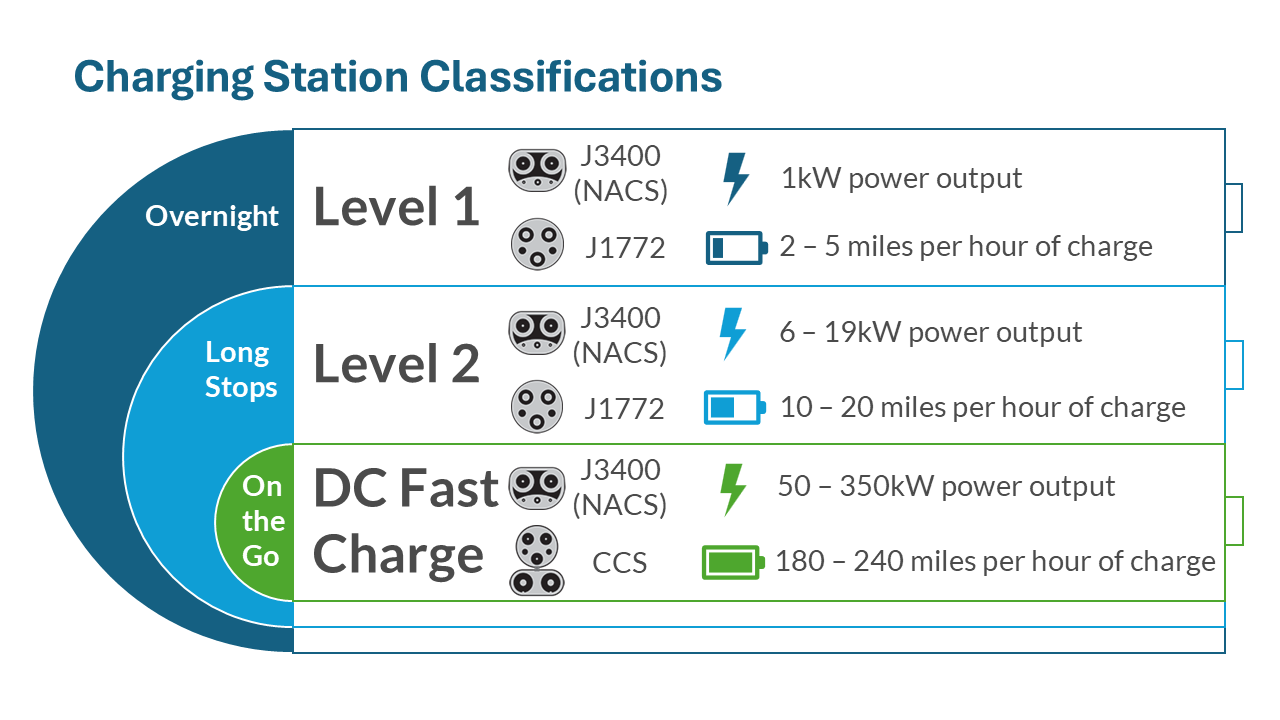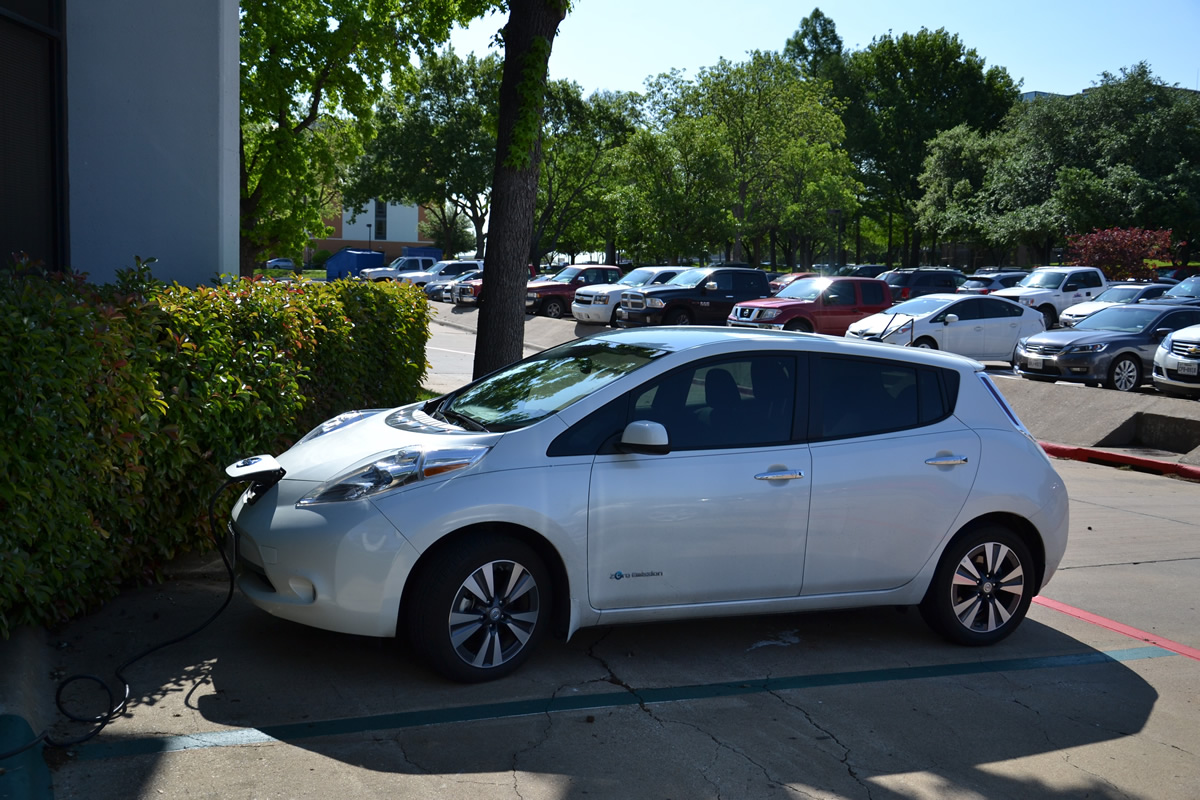Electric vehicles are being utilized now more than ever. Even on a global scale, over one in five new cars sold were battery-electric or plug-in hybrid electric in 2024 (Our World in Data).
There are three types of electric vehicles: battery-electric, plug-in hybrid electric, and hybrid electric. Battery electric and plug-in hybrid electric vehicles are charged by are charged by plugging into an electric power source. Battery-electric vehicles are powered solely by electricity stored in batteries. Plug-in hybrid electric vehicles, like battery-electric vehicles, use rechargeable battery packs to power the motor, but also have an internal combustion engine that functions on gasoline. Plug-in hybrids have a more limited electric range than battery-electric vehicles. Hybrid electric vehicles are powered by an internal combustion engine that charges a battery motor which is used to increase efficiency. To find more detailed information about electric vehicle types visit Alternative Fuels Data Center: Electric Vehicles.

There are three levels of EV charging, each serving a different purpose. Level 1 is slow, overnight charging, Level 2 is for long stops of a few hours or more, and Direct Current Fast Charging, or DCFC (also known as Level 3) is for short stops of 20 to 45 minutes. Learn more about the types of charging, different connectors, and other EV charging information at the Alternative Fuels Data Center.

BENEFITS OF ELECTRIC VEHICLES
The many benefits in utilizing EVs include the following. 
- Improving fuel economy
- Reduction of emissions
- Benefits to public health
- Cost savings
- Less vehicle maintenance
- Discounted EV electricity plans
- Charging at home and work
- Electricity is produced domestically
- Electricity source can be renewable
Information on the benefits of EVs can be found at the
Department of Energy’s Alternative Fuels Data Center.
ELECTRIC VEHICLE REGISTRATION DATA AND MAPS
DFWCC collects monthly data on the number of EVs registered in the state of Texas. The page includes maps of current EV registrations and EV chargers, detailed breakdowns on which makes, models, and classes of vehicles are in Texas, and downloadable data for your own research. Access the data on the EV Registration Data and Maps page.
ELECTRIC VEHICLES IN NORTH TEXAS
In North Texas, fleets are adopting new electric vehicles every year. Since 2009, data compiled from DFWCC’s Annual Report shows reductions of over 800,000 gallons of gasoline equivalent (GGE) from local fleets utilizing electric vehicles. Based on data submitted by local fleets for the DFWCC Annual Report, the Coalition administers the DFWCC Fleet Recognition Program, which recognizes fleets for their efforts and showcases success stories. Additionally, DFWCC hosts educational events such as Drive Electric Earth Day and National Drive Electric Week (NDEW, now known as national Drive Electric Month). The 2024 Dallas-Fort Worth NDEW event brought in nearly 400 people and showcased almost 100 electric vehicles.
North Texas Zero Emissions Vehicles (NTxZEV) Project
NCTCOG was awarded $60 million by the Environmental Protection Agency under the Vocational Sub-Program of the Clean Heavy-Duty Vehicles Program. The project aims to reduce emissions by replacing non-zero-emission Class 6 or 7 vehicles with zero-emission vehicles. A Call for Projects is currently open and accepting applications through Friday, February 13, 2026.
National Drive Electric Month (NDEM)
DFWCC participates annually in National Drive Electric Month (formerly known as National Drive Electric Week), a nationwide initiative by Plug In America to accelerate the shift to EVs. The 2025 DFWCC National Drive Electric Month event brought in over 300 people and allowed more than 100 people to test drive an electric vehicle at Arts and Autos – Electric Avenue in Denton, Texas.
Fleet Recognition
Using data submitted by local fleets through the DFWCC Annual Survey, DFWCC awards and recognized fleets that go the extra mile to reduce petroleum usage and improve air quality in North Texas.
ELECTRIC VEHICLE INFRASTRUCTURE IN NORTH TEXAS
North Texas Electric Vehicle Infrastructure Program
In 2024, NCTCOG was awarded $15 by the Federal Highway Administration to build up to 100 new publicly accessible EV charging ports on public property in the 16-county NCTCOG region. Residents of the region are invited to provide feedback on the project at PublicInput.com.
North Texas Reliable Electric Vehicle Infrastructure Project (NTx-REVI)
NCTCOG was awarded $3.66 million through the Federal Highway Administration to repair or replace existing but non-operational EV charging stations in the 16- county NCTCOG region.
North Texas Resilient Electric Vehicle Charging Plan (NTX-REV)
This initiative, led by NCTCOG and funded by the U.S. Department of Energy’s Joint Office of Energy and Transportation, aims to enhance the resiliency of EV charging infrastructure and ensure critical EV operations can continue during grid disruptions.
Charging Smart
DFWCC is a partner in this national designation and technical assistance program that awards municipalities for steps taken to become more EV-ready through the streamlining of administrative processes.
GUMBO
Led by Louisiana Clean Fuels and implemented by DFWCC and other coalitions, this workforce development program aims to incorporate EV charging station technician training into curricula at local community colleges.
Planning Resilient EV Charging in North Texas
NCTCOG was awarded $ 1.5 million in funding from the U.S. Department of Energy’s Joint Office of Energy and Transportation to develop a regional plan for resilient EV charging infrastructure. This initiative aims to create a framework to ensure that critical EV operations can continue during power grid disruptions.
ELECTRIC VEHICLES IN THE STATE OF TEXAS
Texas is the third leading state for EV registration with over 400,000 registered EVs (Alternative Fuels Data Center). The following resources provide information about policies, plans, advocacy organizations, and grants available for electric vehicles.
Texas EV Alliance
First established in Spring 2018 with a focus in increasing electric mobility and a push for policies that will promote electrifying Texas, this organization maintains partnerships with national, state, and local entities and communities that increase accessibility to electric vehicles and endorse EV adoption.
Texas EV Infrastructure Plan
The Texas EV Infrastructure Plan was developed by the Texas Department of Transportation to implement federal funds through the National Electric Vehicle Infrastructure (NEVI) Plan that will be used to build EV chargers along Alternative Fuel Corridors, in county seats, and in Metropolitan Planning Areas across the state.
Texas Emissions Reduction Plan (TERP)
As a program of the Texas Commission on Environmental Quality, TERP offers grants to Texans for the purchase of new vehicles and equipment that reduce emissions, with electric vehicles being eligible for many of these programs.
TxVEMP All-Electric Grant Program
The Texas Commission on Environmental Quality is currently accepting applications under the All-Electric Program to fund entities in replacing or upgrading vehicles with electric alternatives. Up to 100% funding is available for government-owned projects and up to 75% for non-government-owned projects.
ELECTRIC VEHICLES AND INFRASTRUCTURE AT THE FEDERAL LEVEL
Qualified Commercial Clean Vehicle
During August 2025, Congress signed into law the budget reconciliation bill which eliminates the use of the 30C tax credit after a certain date.
- The Tax Credit for Alternative Fuel Refueling Property (Section 30C) will be eliminated for refueling property (including electric vehicle charging installations) placed in service after June 30, 2026.The 30C tax credit offers up to 30% of project costs, up to $100,000, that can be used for each unit of charging infrastructure in low-income and non-urban areas.
Tax-exempt entities can claim the credit by filing a Form 990-T, Exempt Organization Business Income Tax Return with a Form 3800, General Business Credit attached. Elective pay is the process which allows tax-exempt entities to claim the IRA clean energy and clean vehicle tax credits. Detailed information on elective pay can be found at IRS Elective Pay Overview. For additional information, see IRS State and Local Governments and IRS Tax-Exempt Organizations.
Clean Heavy-Duty Vehicles Program
Under the Inflation Reduction Act, the Environmental Protection Agency (EPA) established a Clean Heavy-Duty Vehicles grant program to replace existing Class 6 and 7 vehicles with zero-emission vehicles and related infrastructure. This program funded the North Texas Zero Emissions Vehicles Project.
Clean School Bus Program
Initiated by the EPA, the program aims to replace existing school buses with zero-emission and clean school buses, with over $5 billion in funding under the Bipartisan Infrastructure Law spanning at least five years. The main goal of the program is to improve air quality and reduce greenhouse gas emissions in the school transportation sector.
Diesel Emissions Reduction Act Program
The Diesel Emissions Reduction Act (DERA) program is focused on reducing emissions from diesel engines. The program provides funding of projects wishing to upgrade or replace existing diesel engines with cleaner alternatives.
National Electric Vehicle Infrastructure (NEVI) Program
NEVI is a $5 billion nationwide investment in EV charging intended to enable reliable interstate travel across the country.
FIND AN EV CHARGING STATION
RESOURCES
General Information
- Electricity Basics - Production, Distribution, Research, and Development (Alternative Fuels Data Center)
- Electric Vehicles (Alternative Fuels Data Center)
- Electricity Benefits & Considerations (Alternative Fuels Data Center)
- Electricity Case Studies (Alternative Fuels Data Center)
- Electricity Publications (Alternative Fuels Data Center)
Laws and Incentives
- Electricity Laws and Incentives in Texas (Alternative Fuels Data Center)
- Federal Electricity Laws and Incentives (Alternative Fuels Data Center)
Locate Charging Infrastructure
- Find a Level 1 Charging Station (Alternative Fuels Data Center)
- Find a Level 2 Charging Station (Alternative Fuels Data Center)
- Find a DC Fast Charging Station (Alternative Fuels Data Center)
- Find an Electric Charging Corridor (Alternative Fuels Data Center)
Electric Vehicle Safety
- Electric Vehicle Safety (National Fire Protection Association)
- Electric & Hybrid Vehicles: Battery, Charging & Safety (National Highway Traffic Safety Administration)
